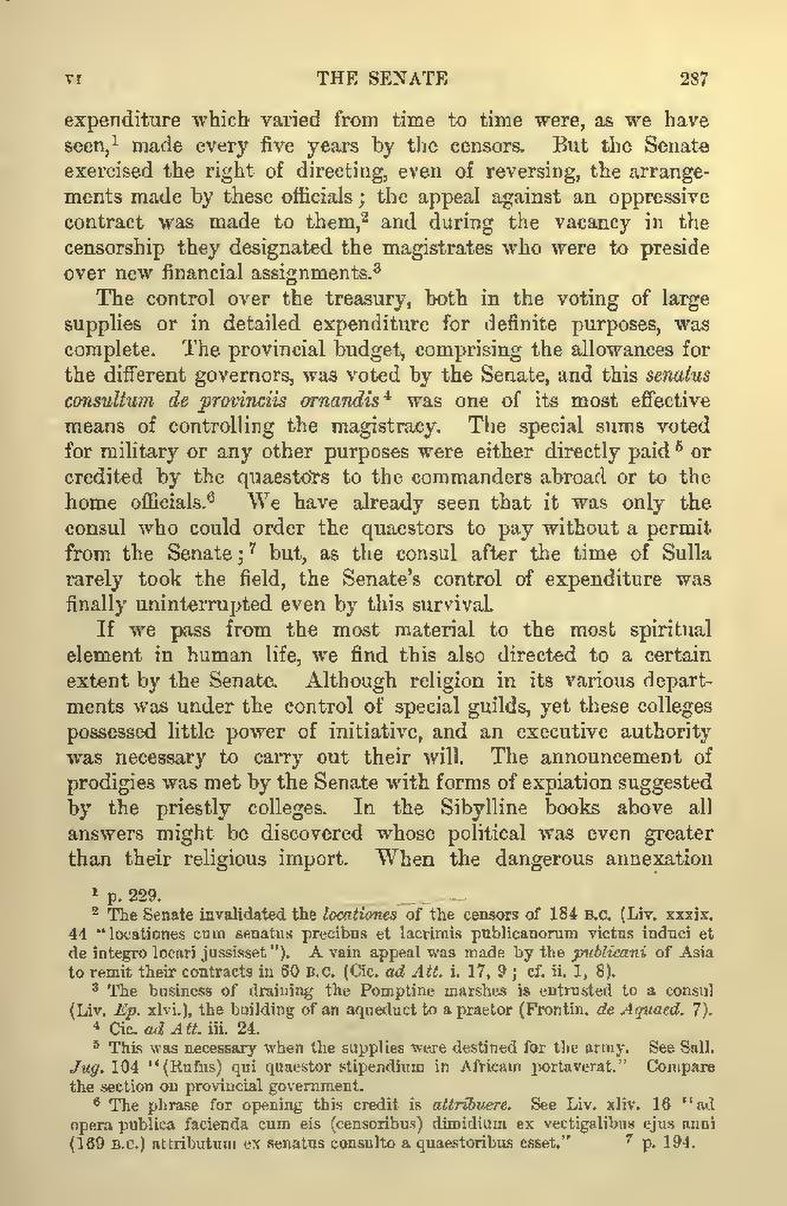expenditure which varied from time to time were, as we have seen,[1] made every five years by the censors. But the Senate exercised the right of directing, even of reversing, the arrangements made by these officials; the appeal against an oppressive contract was made to them,[2] and during the vacancy in the censorship they designated the magistrates who were to preside over new financial assignments.[3]
The control over the treasury, both in the voting of large supplies or in detailed expenditure for definite purposes, was complete. The provincial budget, comprising the allowances for the different governors, was voted by the Senate, and this senatus consultum de provinciis ornandis[4] was one of its most effective means of controlling the magistracy. The special sums voted for military or any other purposes were either directly paid[5] or credited by the quaestors to the commanders abroad or to the home officials.[6] We have already seen that it was only the consul who could order the quaestors to pay without a permit from the Senate;[7] but, as the consul after the time of Sulla rarely took the field, the Senate's control of expenditure was finally uninterrupted even by this survival.
If we pass from the most material to the most spiritual element in human life, we find this also directed to a certain extent by the Senate. Although religion in its various departments was under the control of special guilds, yet these colleges possessed little power of initiative, and an executive authority was necessary to carry out their will. The announcement of prodigies was met by the Senate with forms of expiation suggested by the priestly colleges. In the Sibylline books above all answers might be discovered whose political was even greater than their religious import. When the dangerous annexation
- ↑ p. 229.
- ↑ The Senate invalidated the locationes of the censors of 184 B.C. (Liv. xxxix. 44 "locationes cum senatus precibus et lacrimis publicanorum victus induci et de integro locari jussisset"). A vain appeal was made by the publicani of Asia to remit their contracts in 60 B.C. (Cic. ad Att. i. 17, 9; cf. ii. 1, 8).
- ↑ The business of draining the Pomptine marshes is entrusted to a consul (Liv. Ep. xlvi.), the building of an aqueduct to a praetor (Frontin. de Aquaed. 7).
- ↑ Cic. ad Att. iii. 24.
- ↑ This was necessary when the supplies were destined for the army. See Sall. Jug. 104 "(Rufus) qui quaestor stipendium in Africam portaverat." Compare the section on provincial government.
- ↑ The phrase for opening this credit is attribuere. See Liv. xliv. 16 "ad opera publica facienda cum eis (censoribus) dimidium ex vectigalibus ejus anni (169 B.C.) attributum ex senatus consulto a quaestoribus esset."
- ↑ p. 194.
